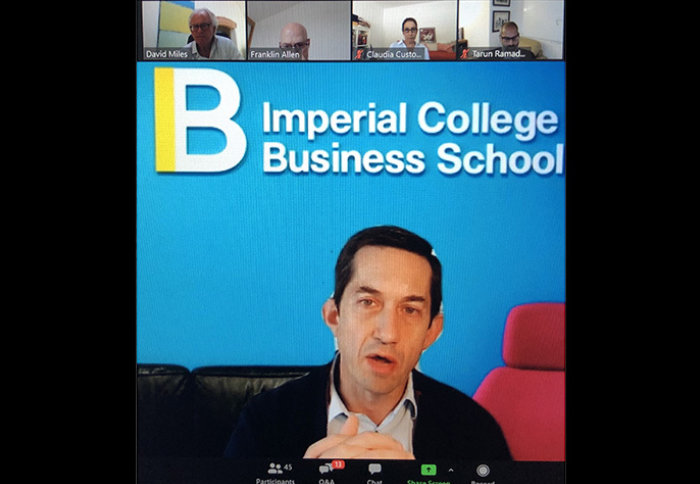Finance experts discuss impact of coronavirus on the economy

Professor Francisco Veloso chairing The Dean's Lounge webinar hosted by the Business School
A Business School academic has argued it is time for the UK government to ease certain lockdown restrictions to prevent further damage to the economy.
David Miles, Professor of Financial Economics, was speaking in a webinar about the impact of the coronavirus on businesses and society, where he spoke alongside other experts from Imperial College Business School.
Speaking at the private Business School event, Professor Miles stressed the significant negative impact of the coronavirus pandemic on the economy and argued there was a need for a “strategy of easing”.
“The price we have paid has been enormous,” he said, referring to the lockdown which has seen shops, restaurants and places of entertainment closed, as well as the majority of the country urged to stay at home, since 23 March.
However, he also shared some reasons to believe the UK economy may recover faster than feared. “In the second quarter of 2020, GDP will be down 30-40 percent in the UK, but it may recover more quickly than in previous recessions because this [the lockdown] will be a concentrated reduction of economic activity,” he said, also pointing to the favourable borrowing climate for the government.
“If ever there was a good time to have a pandemic in terms of cost of government borrowing, it is now. It has never been cheaper for it [the government] in real terms to borrow.”
Professor Miles was also joined in the discussion by Professor Franklin Allen, Dr Claudia Custodio and Professor Tarun Ramadorai. The webinar was chaired by Professor Francisco Veloso, Dean of the Business School.
“Trump has taken a very anti-China stance and it would be better for the world if these countries got back together and cooperated.” Franklin Allen Professor of Finance and Economics, Business School
Professor Allen compared the US and Chinese reactions to the current crisis, arguing that China has dealt with the health crisis more efficiently, on top of which its economy has proven more robust than the US economy, where unemployment has risen to nearly 15 percent “very quickly” during the pandemic.
Professor Allen also pointed to the deepening animosity between the US and China, particularly over recent developments in Hong Kong.
"One of the things that is difficult for the world is that these two major economies are not getting on well," he said. “Trump has taken a very anti-China stance and it would be better for the world if these countries got back together and cooperated.”
Meanwhile Dr Custodio looked at the particular challenges faced by African nations during the crisis, including the prominence of the informal sector in Africa, with most people relying on a daily income. During the pandemic, working hours have been squeezed and restrictions on movement have left many unable to earn a living. This has also had a knock-on effect on other low-income earners.
“People with very low incomes are not consuming and they are not consuming goods that are produced by other people with very low incomes,” she said. “The estimated social and economic impact is immense. This is on top of a situation that was already a challenge – much more so than for the rest of the world.”
She also raised the issue of the fragility of Africa’s healthcare systems, which in some nations are already facing a high presence of other “important diseases” such as HIV.
Professor Ramadorai discussed the financial vulnerability of households in India compared to those in developed nations.
Article text (excluding photos or graphics) © Imperial College London.
Photos and graphics subject to third party copyright used with permission or © Imperial College London.
Reporter
Evie Burrows-Taylor
Business School